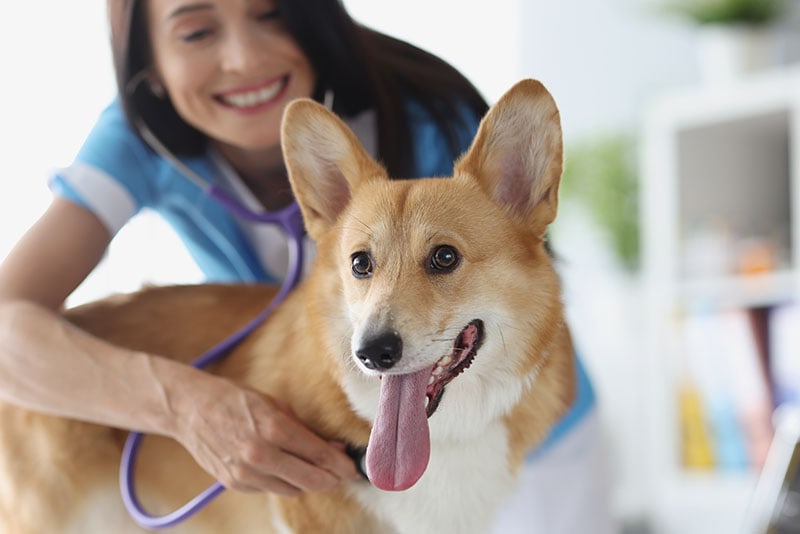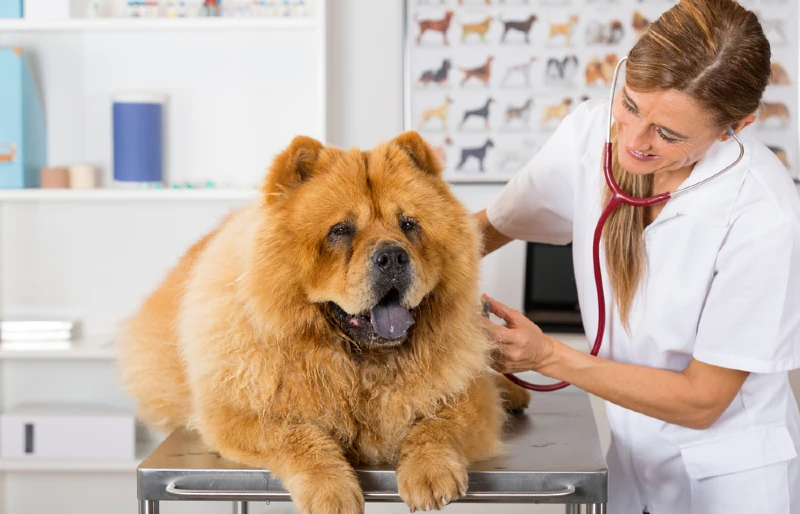
In dogs, bronchitis is a relatively common problem. In humans, bronchitis is usually thought of as an infectious problem. And in dogs, it can be an infection, but it can also be present in other ways. Hopefully, if your dog has been diagnosed with bronchitis, it is an acute, short-term problem. Chronic bronchitis can get a little complicated
This article will discuss the differences. It will help you learn how to identify bronchitis if your dog gets it and arm you with tools to help them. 
What Is Bronchitis?
Bronchitis can be a short, acute problem, or it can be a chronic, long-term problem that waxes and wanes. In both cases, though, it is caused by inflammation, swelling, and irritation in the lower respiratory tract—in the lungs. This inflammation causes a dog to cough.
Acute bronchitis
Acute bronchitis appears quickly, seemingly out of nowhere, and goes away quickly as well.
In acute bronchitis, the primary cause needs to be identified and managed for the best results. Acute bronchitis is commonly caused by infectious agents, bacteria and viruses, or both. They cause inflammation, and if the infection goes away (which it usually does), then the bronchitis improves. It can improve in 5–7 days, but sometimes it may take 3 or 4 weeks, depending.
Chronic bronchitis
Chronic bronchitis is when the inflammation sticks around for longer than two months.
The cough can wax and wane, but it is a persistent problem. The inflammation may have once been caused by infection, but it no longer is. It is a response in the body to long-term irritation so that the inflammation is pretty much out of control.

The Signs of Bronchitis
Coughing is the most apparent sign of bronchitis.
Coughing in a dog can be confused with other things, such as sneezing, reverse sneezing, or even gagging. Coughing is often much louder and more persistent than these problems, though. Although if your dog reverse sneezes, it is good to get to know what that sounds like so you can tell the difference.
A cough caused by bronchitis tends to sound wet; however, it is more productive than a dry cough. They may cough in spasms or intermittently. They may cough after an activity or randomly at any time.
Coughing is a sign of many problems, such as pneumonia, heart disease, lung cancer, or other respiratory diseases besides bronchitis. So, if your dog coughs persistently, they need a physical exam with a vet. Although a dog with bronchitis can also have multiple problems, any of which can be concurrent.
Some dogs may also demonstrate exercise intolerance, an inability to exercise as much as they used to. But most dogs with chronic bronchitis act otherwise normal; they just cough.

The Causes of Bronchitis
Acute bronchitis
Acute bronchitis can happen in any dog breed and at any age. It is commonly caused by infectious agents, but it can also be caused by sudden exposure to harmful inhalants, such as smoke. The cause may never be concretely identified, especially if treatment cures it quick enough.
Chronic bronchitis
Most common in middle age and older dogs. Smaller dogs are also more likely to have it. Once inflammation occurs in the lungs (after a bout of acute bronchitis, for example), it can lead to permanent changes, especially if it is severe or lasts long enough. The permanent changes not only make the lungs less efficient at breathing air, but they also make the inflammation more likely to come back if it ever goes away completely, that is.
How Do I Care for a Dog with Bronchitis
The most helpful thing is to get your vet involved.
Acute bronchitis
If you suspect bronchitis or infectious bronchitis, book an appointment with your vet right away. But also tell them that is what you suspect, so they can take extra precautions at the clinic, so the infection doesn’t spread to other dogs. Tell them before you enter the building. Call and ask for instructions on how to come in with your potentially infectious dog.
Caring for Acute Bronchitis at Home
Chronic bronchitis
Vet visits work best with frequent check-ins; once every 3–6 months to make sure everything is managed just right is a good idea. Having a vet who knows their pattern of cough is more helpful for improving their quality of life.
Caring for Chronic Bronchitis at Home
Dogs with chronic bronchitis may be put on medication to help their lungs function, but things you do at home can also be helpful.


Frequently Asked Questions (FAQs)
How will a vet diagnose chronic bronchitis?
Chronic bronchitis may take a while to diagnose. It can take a long time to know something is chronic. Plus, since there are so many other things that a cough can be caused by, these other ‘things’ need to be ruled out first.
Diagnostic tests such as bloodwork, X-rays, and even taking samples of the airways can help a vet get to a diagnosis.
What is the prognosis for chronic bronchitis?
The severity of chronic bronchitis will dictate its prognosis. Severe chronic bronchitis can be quite limiting and impede a dog’s quality of life. Or it can also wax and wane so that there are periods of more intense inflammation and cough, followed by periods of relative calm. This is the most common pattern, in fact.
Mild bronchitis might just be a pestering problem that flares up and is dealt with quickly.

What’s the difference between bronchitis and pneumonia?
Bronchitis inflammation is not as deep in the lungs as pneumonia goes, but it’s lower than the upper airways, where sinusitis causes inflammation. It is between the two, in the bronchi, which is what that part of the airways is called.
Acute bronchitis is closely related to pneumonia; both are inflammation of the lungs. But pneumonia is much more severe as the infection is much deeper and more insidious. But bronchitis can also switch to pneumonia easily. Both acute and chronic bronchitis can escalate to pneumonia.
Why is my dog’s bronchitis getting worse?
Inflammation causes a cough, which is irritating and causes more inflammation. So, bronchitis can be a difficult cycle of inflammation to break. As a dog coughs, the irritation and mucus are stimulated to become more.
Conclusion
Bronchitis can look different in different dogs and in different scenarios, but overall, TLC is the best thing for it. Keeping your dog’s lungs healthy means providing exercise and fresh, clean air. Getting their vaccines, including kennel cough—even if they don’t go to a kennel—are all necessary steps to prevent bronchitis.
Hopefully, this has helped explain some of the different ways bronchitis can affect your dog and helps you know how to provide the best tender loving care.
Featured Image Credit: vet_Duet PandG, Shutterstock




